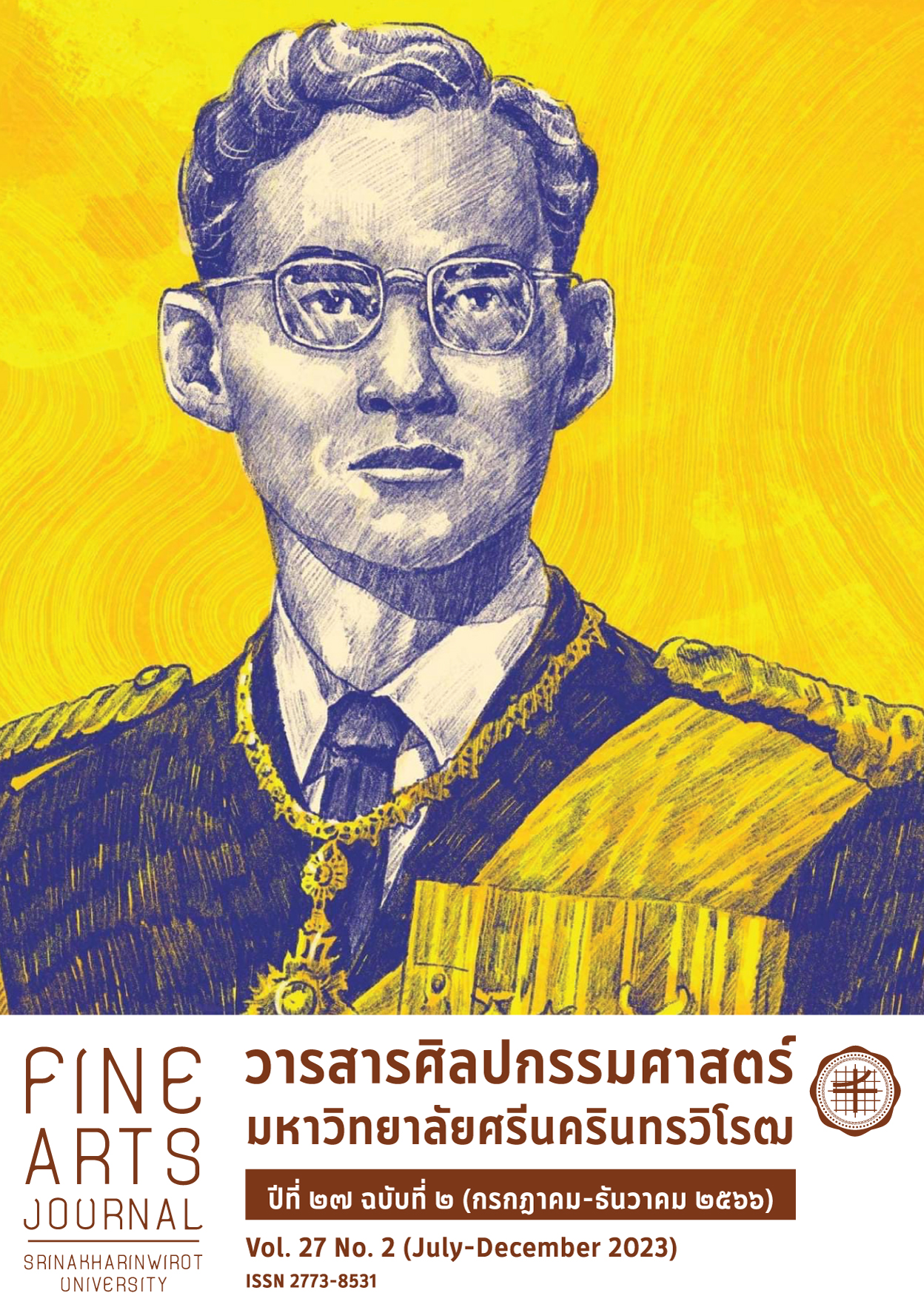CHRISTIAN SIGNS AND SYMBOLS IN THE ART OF VIOLIN MAKING
Keywords:
Christian, Cremona, sign, symbol, violinAbstract
The art of violin making was established in the 16th Century in Cremona, Northern Italy. During the Renaissance period, Christianity had a significant influence on culture, architecture, and arts. The early violin makers were inspired by a musical instrument appeared in moral paintings. The symbols used by highly skilled craftsmen and symbols in Christian arts were integrated to respect and make devotion to God. The inspiration also included the connection between the Church and that era's political and governance power. This article draws on the database of instruments from Amatus, Stradivarius, Guarnerius 'del Gesu', created during the golden period of violin making during 1556 - 1737, to analyze the signs, symbols, and their meanings to gain an understanding of the various symbols in the art of violin making, which has been continued to the modern violin makers.
Downloads
References
พยานพระยะโฮวา. (2563). สวรรค์. สืบค้นเมื่อ 18 เมษายน 2564 จาก https://www.jw.org/th/หนังสือและสื่อ
ต่างๆ/วารสาร/ตื่นเถิดมกราคม2016/คัมภีร์ไบเบิลกับสวรรค์.
เฟอร์กูสัน, จอร์จ. (2562). เครื่องหมายและสัญลักษณ์ในคริสตศิลป์ (กุลวดี มกราภิรมย์, ผู้แปล) (พิมพ์ครั้งที่ 9).
กรุงเทพมหานคร: อมรินทร์พริ้นติ้ง.
เสาวลักษณ์ สุวรรณภัค. (2556). การตีความสัญลักษณ์ของนักศึกษาที่เรียนภาษาไทยเป็นภาษาที่สอง โดยใช้บริบท
ทางวัฒนธรรมในวรรณกรรมไทย (วิทยานิพนธ์ปริญญามหาบัณฑิต). มหาวิทยาลัยเชียงใหม่, เชียงใหม่.
สืบค้นเมื่อ 20 สิงหาคม 2561 จาก
https://archive.lib.cmu.ac.th/full/T/2556/thai41156ss_ch2.pdf
Badiarov, D. (2012). What is bridge?. Retrieved April 20, 2021, from
http://violoncellodaspalla.blogspot.com/2012/01/why-badiarov-violin-bridges-are-
always.html.
Badiarov Violins. (n.d.). Author, luthier, violoncello da spalla maker. Retrieved April 20, 2021, from
http://violoncellodaspalla.blogspot.com/2012/01/why-badiarov-violin-bridges-are-
always.html
Barabaschi, A. (2015, December 2). Stradivari’s Medici Quintet, part 2. Retrieved April, 7, 2021,
from https://tarisio.com/cozio-archive/cozio-carteggio/stradivaris-medici-quintet-part-2/
Bein, R., & Fushi, G. (1998). Miracle Makers: Stradivari, Guarneri, Oliveira. Chicago, USA: Bein & Fushi.
D'Harmonie, B. (n.d.). Carved fittings. Retrieved August, 30, 2021, from
https://www.boisdharmonie.net/en/accessories/carved-fittings
Ensign, A. (2020). The Fleur-de-lis and its meanings and uses. Retrieved June, 10, 2021, from
https://www.familysearch.org/en/blog/fleur-de-lis-symbolism-and-meaning
Fein, A. & Newgren, A. (2011). The Lady Blunt Stradivarius Violin. Retrieved April, 7, 2021, from
http://blog.feinviolins.com/2011/06/lady-blunt-stradivarius-violin.html
Foster, M. (2004). History of the Maltese Cross, as used by the order of St John of Jerusalem.
Retrieved June 26, 2021, from
http://www.lishfd.org/History/history_of_the_maltese_cross.htm
Hill, W.H., Hill, A.F., & Hill, A.E. (1963). Antonio Stradivari: His life and work (1644–1737).
London, UK: Dover.
Hill, W.H., Hill, A.F., & Hill, A.E. (1965). The Violin-makers of the Guarneri family, 1626-1762.
London, UK: Dover.
Internet Cello Society. (2020). Tutti celli contents. Retrieved August 8, 2021, from
http://www.cello.org/heaven/hill/nine.htm
Luthier, K.L. (2006). Instruments by Antonio Stradivari: The 1693 Harrison Stradivari violin.
Retrieved June 30, 2021, from https://www.kevinleeluthier.com/stradivari/Stradivarius.htm
Maccarrone, P.P. (2020). The Amati family. Retrieved June 30, 2021, from
https://pierpaolomaccarrone.com/2020/07/23/the-amati-family-%F0%9F%8E%BB-la-
familia-amati-%F0%9F%8E%BB/
Orphean Foundation. (2019). The oldest violin in history. Retrieved June 17, 2021, from
http://orpheon.org/educational/documents/articles-on-the-violin-family/oldest-violin
Parnell, C. (2015, March 12). Antonio Stradivari – Instrument maker for the divine. Retrieved
August 31, 2021, from https://saieditor.com/?p=498
Pettit, S. (2018). Psalm 150: Hallelujah! encountering God. Retrieved June 23, 2021, from
https://today.bju.edu/president/psalm-150-hallelujah/
Price, J. (2019, February 13). Giuseppe Rocca, the ‘ex-Maud Powell’: The 1856 Rocca violin
owned by Maud Powell, which was recently sold by Tarisio by private sale. Retrieved
April 16, 2021, from
https://tarisio.com/cozio-archive/cozio-carteggio/giuseppe-rocca-the-ex-maud-powell/
Price, J. (2022, March 8). How the ‘da Vinci’ got its name. Retrieved April 15, 2022, from
https://tarisio.com/cozio-archive/cozio-carteggio/how-the-da-vinci-got-its-name/
Sirr, S. (2017). Scanning the heavens. In C. Smith (Ed.), The Strad. London, UK: Newsquest.
Sthvecu. (2019). The Medici: Benefactors of your sightseeing in Florence. Retrieved April 7, 2021,
from https://wandervirtually.com/a-quick-intro-to-the-medici-benefactors-of-your-tour-in-florence/
Tarisio. (n.d.). Antonio Stradivari, Cremona, 1716, the ‘Messiah, Messie, Salabue. Retrieved April
, 2021, from https://tarisio.com/cozio-archive/property/?ID=40111
Zana Bihiku Tutt’Art. (n.d.). Gaudenzio Ferrari: The concert of angels, 1534-1536. Retrieved April 24, 2021,
from https://www.tuttartpitturasculturapoesiamusica.com/2017/12/Gaudenzio-Ferrari.html
Zygmuntowicz, S. (2006). Strad 3D Traditions meets Science. Retrieved August 18, 2021, from
Downloads
Published
How to Cite
Issue
Section
License

This work is licensed under a Creative Commons Attribution-NonCommercial-NoDerivatives 4.0 International License.






